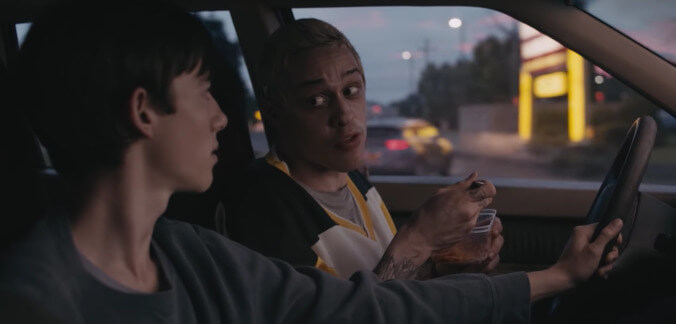Davidson is Zeke, a 23-year-old stoner who lives in a makeshift frat house where booze, drugs, and video games are the primary focus of his non-working hours (and often his working ones as well). Zeke’s is a familiar story of 21st century arrested development, except for the fact that his best friend is a nerdy 16-year-old high schooler named Monroe “Mo” Harris (American Vandal’s Griffin Gluck). The kid brother of Zeke’s old girlfriend, Mo has spent the past six years hanging around the fringes of Zeke’s depraved world, thirstily drinking it all in (often literally). The friendship is genuine, if inherently unbalanced. Mo wants to experience adulthood through Zeke, while Zeke is trying to vicariously relive his childhood through Mo. When one character suggests they’re like Batman and Robin, Mo counters that they’re more like “Batman and Batman’s fucked up older friend.”
For his debut feature, writer-director Jason Orley (who also helmed Davidson’s recent Netflix comedy special) treads familiar coming-of-age ground that calls to mind dynamics from Almost Famous or Adventureland. Yet Orley’s sensitive approach and the commitment of his actors somewhat makes up for the lack of originality. The strange scum-bum charisma that made Davidson pop on SNL is exactly what draws Mo to Zeke as half-kid brother/half-groupie. And Mo’s self-awareness adds a sense of equality to their relationship, too, at least until the power dynamics shift when Zeke realizes he can use his young friend to peddle drugs to rich teens happy to pay way over market value.
Orley is careful to add a humanizing depth to nearly all of his characters, save a handful of underwritten female roles—particularly Zeke’s girlfriend, Holly (Sydney Sweeney), who starts out intriguing only to get wrapped up in the film’s weakest through-line. Better served is Gluck, whose endearingly thoughtful demeanor calls to mind a young Anthony Michael Hall or 10 Things I Hate About You–era Joseph Gordon-Levitt. Meanwhile, one-time nerdy teen lead Jon Cryer (rocking his Lex Luthor look) turns in a beautifully understated performance as Mo’s overwhelmed dad, who’s worried about Zeke’s influence but even more frustrated that his son is doing so many bonding activities with someone else. Orley never loses sight of Zeke’s appeal, even as the film starts to chip away at the harmlessness of his affable exterior.
The first half of Big Time Adolescence cultivates an enjoyably breezy hangout vibe (including a surprisingly great comedic turn from Colson Baker, a.k.a. rapper Machine Gun Kelly) that coasts along on Davidson and Gluck’s natural chemistry. But the film grows less steady as it attempts to create a narrative spine that never quite snaps into place. Although Orley is smart not to push the melodrama too far, that leaves his already overly familiar story without much meat on its bones. Big Time Adolescence is funny but not hilarious, poignant but not particularly deep. Still, it’s a strong starting point for all its collaborators on their own roads to creative maturation.











![Rob Reiner's son booked for murder amid homicide investigation [Updated]](https://img.pastemagazine.com/wp-content/avuploads/2025/12/15131025/MixCollage-15-Dec-2025-01-10-PM-9121.jpg)

























![HBO teases new Euphoria, Larry David, and much more in 2026 sizzle reel [Updated]](https://img.pastemagazine.com/wp-content/avuploads/2025/12/12100344/MixCollage-12-Dec-2025-09-56-AM-9137.jpg)



